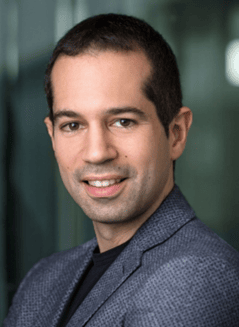Keynote Speakers

Dr. Sami Haddadin
Tactile Robots: Building the Machine and Learning the Self
Abstract
The development of robots that can learn to interact with the world and manipulate the objects in it has emerged as one of the greatest and so far largely unsolved challenges in robotics research. In this talk, I will argue that the development of such advanced machines requires a transition from classical manual design with purely model-based control to a novel paradigm. We need to allow the machine to autonomously develop its own blueprint and generate its topological, kinematic, and dynamic self. Building on this, it shall develop controls for its own body as it moves, learns to manipulate objects in a controlled way, and sensitively interacts with the world.
Drawing from our work in torque-controlled lightweight robots towards human-safe tactile robots that can manipulate, fly, or drive, I explain the technological quantum leaps that recently have taken place. In particular, this progress was made possible by human-centered design, soft and force-sensitive control, contact reflexes, and model-based machine learning. In the real world, by enabling human-robot coexistence, collaboration, and interaction for the first time, this robotic technology has proven transformative to traditional manufacturing already around the globe. Increasingly, it is now impacting professional services, domestic applications, medicine and healthcare.
Then, I will use our current work to chart the path toward the next generation of tactile machines. We have taken first steps towards increasingly autonomous designing and building machines that have the ability to learn their self and thus adapt to changes in body topology and ultimately their entire dynamics. Finally, I will present recent results on designing modular control and learning architectures that achieve complex behaviors for challenging manipulation problems while being provably stable.
Biography
Dr. Sami Haddadin is the Director of the Munich Institute of Robotics and Machine Intelligence at the Technical University of Munich (TUM) and holds the Chair of Robotics and Systems Intelligence. His research interests include human-centered robotics, embodied AI, collective intelligence and human-robot sybiosis. He is best known for his contributions to tactile mechatronics, contact-aware robots, safety methods in human-robot interaction, and autonomous manipulation learning. Before joining TUM, he was Chair of the Institute of Automatic Control at Gottfried Wilhelm Leibniz University Hannover from 2014 to 2018. Prior to that, he held various positions as a researcher at the German Aerospace Center DLR. He holds degrees in electrical engineering, computer science and technology management from the Technical University of Munich and the Ludwig Maximilian University of Munich. He received his PhD with summa cum laude from RWTH Aachen University and published more than 200 scientific articles in international journals and conferences, many of them award-winning. He has received numerous awards for his scientific work, including the George Giralt PhD Award (2012), the RSS Early Career Spotlight (2015), the IEEE/RAS Early Career Award (2015), the Alfried Krupp Award for Young Professors (2015), the German President’s Award for Innovation in Science and Technology (2017) and the Leibniz Prize (2019).

Dr. Davide Scaramuzza
Learning Autonomous Vision-based Flight
Abstract
I will summarize our latest research in learning deep sensorimotor policies for agile vision-based quadrotor flight. Learning sensorimotor policies represents a holistic approach that is more resilient to noisy sensory observations and imperfect world models. However, training robust policies requires a large amount of data. I will show that simulation data is enough to train policies that transfer to the real world without fine-tuning. We achieve one-shot sim-to-real transfer through the appropriate abstraction of sensory observations and control commands. I will show that these learned policies enable autonomous quadrotors to fly faster and more robustly than before, using only onboard cameras and computation. Applications include acrobatics, high-speed navigation in the wild, and autonomous drone racing.
Biography
Dr. Davide Scaramuzza is a Professor of Robotics and Perception at the University of Zurich, where he does research at the intersection of robotics, computer vision, and machine learning. His goal is to enable autonomous, agile navigation of micro drones using both standard and neuromorphic event-based cameras. He pioneered autonomous, vision-based navigation of drones, which inspired the navigation algorithm of the NASA Mars helicopter. He has served as a consultant for the United Nations on topics such as disaster response and disarmament, as well as the Fukushima Action Plan on Nuclear Safety. He won many prestigious awards, such as a European-Research-Council Consolidator grant, the IEEE Robotics and Automation Society Early Career Award, an SNF-ERC Starting Grant, a Google Research Award, a Facebook Distinguished Faculty Research Award, two NASA TechBrief Awards, and several paper awards. In 2015, he co-founded Zurich-Eye, today Facebook Zurich, which developed the world-leading virtual-reality headset, Oculus Quest, which sold over 10 million units. Many aspects of his research have been prominently featured in broader media, such as The New York Times, The Economist, Forbes, BBC News, and Discovery Channel.